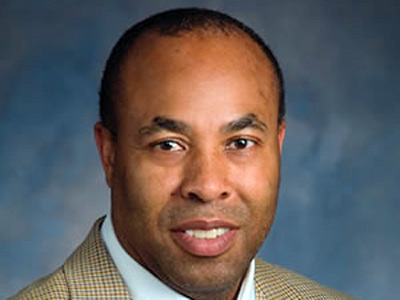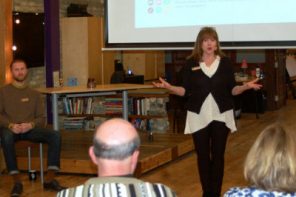School board elections take place on April and in District 8 there are three candidates and, therefore, a primary on Feb. 15. In order to help you make a more informed decision at the polls in this race, which often flies under the radar, we’ve asked each of the 11 candidates — running for five seats on the 9-member board (there are eight regional districts and one at-large seat) — to respond to a list of questions and we will run them in the weeks leading up to the election.
Next up is District 2 incumbent Jeff Spence, who faces challenger Gerald S. Glazer. The district is on the city’s near northwest side. A map of districts is here.
OnMilwaukee.com: Tell us about your background and how your experience will be an asset to the Milwaukee Public Schools board.
Jeff Spence: I am a lifelong resident of Milwaukee. I hold degrees in chemistry and business administration. I have close to 20 years of experience in the private sector — as a chemist, and manager at Aldrich Chemical — and 12 years in the public sector managing a wide range of functions at the Milwaukee Metropolitan Sewerage District — human resources, procurement, an environmental laboratory, work force development initiative, historically underutilized business initiative and the Milorganite fertilizer business unit. I also held a license as a real estate appraiser and temporarily work for our family firm Central City Valuation Services. In 1999, I was named one of 40 under 40 by the Milwaukee Business Journal.
I am married to Jana Spence, a special education teacher in Milwaukee Public Schools for 25 years. My wife and I have lived at our current address for the last 18 years. We are the proud parents of two sons who are MPS graduates. Josh is a senior at Iowa State University, and Jake a Sophomore at Northwestern University. I have participated on school governance councils at Hi Mount Elementary and at Golda Meir School for the Gifted and Talent.
I served as basketball coach for Golda Meir and Roosevelt Middle School of the Arts. I’ve coached little league baseball for both North Central Little league, and Beckum-Stapleton Little League. I mentor students through the YMCA’s One on One program. I have had the privilege of serving on a variety of non-profit boards — First stage Children’s Theater, Discovery World, The Gathering, Albright United Methodist church — and am also a trustee for Lakeland College. I have been a school board member for the last 12 years, and have had the privilege of previously serving as board president for two terms.
My experience as a husband, father, son, product of MPS, community volunteer and manager in both the public and private sector give me a unique perspective and set of skills to tackle the complexities of providing a world class educational system for the young people of this city. Growing up in the inner city of Milwaukee, I understand the aspirations of parents who want more for the children. Having the opportunity to attend and graduate from college, I understand the difference an education can make in being ready when opportunity knocks.
Coming from a family with a number of educators, I understand that teaching is a profession that not all can do well, but all should respect. As someone with a business background and twelve years of experience as a school policy maker, I understand the business aspects of public education and the need to make wise choices because these resources are not in-exhaustible. As a community volunteer I, see all of the positive possibilities that exists if we are focused, creative, and can collaborate.
OMC: Are you a graduate of MPS or other public schools?
JS: I and six of my seven siblings are graduates of MPS. I am a 1978 graduate of Rufus King. My sons Josh and Jake are products of MPS graduating from Rufus King in 2007 and 2009, respectively.
OMC: What do you think is the biggest issue facing MPS and what is your plan of attack?
JS: Student achievement and resource placement to that end. Standardizing the core of what we expect our students to learn and methods to achieve those expectations, especially at schools where achievement has been elusive. There are many choices that can be made on how we utilize the taxpayer’s resources; those that will lead to the outcomes that we want for our children should be our priority. Creativity in making those resources go as far as possible is a must.
OMC: What is your opinion on talk of expanding the voucher and Milwaukee Parental Choice Program?
JS: While I have no input in that discussion, I caution those who would make the final decision to “think with the end in mind,” and that end should be greater student achievement across all options. What gives me pause is that we as providers of K-12 educational services in this city — public, choice, charter — are not having conversations around whether or not we have the capacity to service all kids well, in a solely competitive environment.
In an environment where we dilute the teaching talent pool with an oversaturation of schools, one would question whether or not all options are quality options. We’ve gone through a free-market period that hasn’t necessarily lead to stronger educational options for more young people. We are at a crossroads where the various players — public, choice, charter — must work collectively to ensure that whatever options are available to families present great educational value. There is a possibility that MPS may end up with fewer schools, but if the outcome is more kids being successful at achieving acceptable academic gains then Milwaukee and its children are the better for it.
I also question whether or not there is the financial wherewithal to do in the long run if the state isn’t willing to count all of Milwaukee’s kids relative to the state aid formula, especially if choice schools are requesting a higher per pupil allocation. The current legislative fix still requires the taxpayers of Milwaukee to pay a higher percentage to educate children in the choice program than in traditional schools.
OMC: Is there an opportunity for MPS to hold on to students and even draw some back via expansion of specialty schools or other means?
JS: Access to specialty programs would hold some, however I’d like to think that if we’d ask ourselves what we could do at MPS to increase the success rates of the students we have, we’d end up with higher satisfaction, and loyalty ratings from all stakeholders. In a school district with more options than any district in the state, customer satisfaction and loyalty ratings may be lower than others. Other school districts don’t rate themselves by market share.
OMC: How will you work to engage parents in their schools?
JS: Utilize traditional groups such as governance councils, PTAs, PTOs, etc., to communicate issues and receive feedback. Be an open and supportive conduit for parents who are looking for ways to participate.
OMC: How do you think MPS can best expand on the successes in the current system?
JS: Incremental gains are only achievable. If we are not willing to transform the entire K-12 ecosystem and its supports in this city, we as a community will have more young adults not reaching their full educational potential.
OMC: How can MPS deal with the ongoing budget problems — that are poised to grow even worse as the district loses $90+ million in stimulus money, for example — and still offer quality education to Milwaukee children?
JS: It’s not only a question of how much we have, but just as important how we utilize those financial resources. Unfunded long-term benefit obligations rests close to $2.5 billion, requires even more changes in the benefit structure for new employees. Two-tier salary scale. Re-think how we provide support services for children, while maintaining and or increasing the level of service. Collaborate with other entities that can/ should be providing those services.
Reduce the number of schools run, commensurate with the number of students we have. Eliminate busing services for all, except those whose Individual Educational Plans require (it). Shared business services where possible. Work towards changes that would drastically improve the state’s chances for Race to the Top federal dollars.
If we are clear about why we exist — educating our students — we must understand the market dynamics for the basket of services required to do the job and use strategies that take full advantage of those resources.
OMC: There has been much discussion lately of vacant MPS buildings. What is your opinion on the future of these buildings?
JS: Sell those that have no value in current or future use.
OMC: Finally, do you think spring school board elections are problematic? Do they guarantee low turnout at the polls?
JS: Spring elections are typically low turnout elections. I sponsored a resolution to move elections to fall cycles, however it was voted down by the board. The discussion seemed to hover around the issue (that) fall elections tend to be partisan races, while the school board races are non-partisan races. I believe that’s a non-issue, if your goal is to increase voter participation.


 i evaluate to yes even if there's no image
i evaluate to yes even if there's no image  i evaluate to yes even if there's no image
i evaluate to yes even if there's no image  i evaluate to yes even if there's no image
i evaluate to yes even if there's no image  i evaluate to yes even if there's no image
i evaluate to yes even if there's no image  i evaluate to yes even if there's no image
i evaluate to yes even if there's no image  i evaluate to yes even if there's no image
i evaluate to yes even if there's no image 